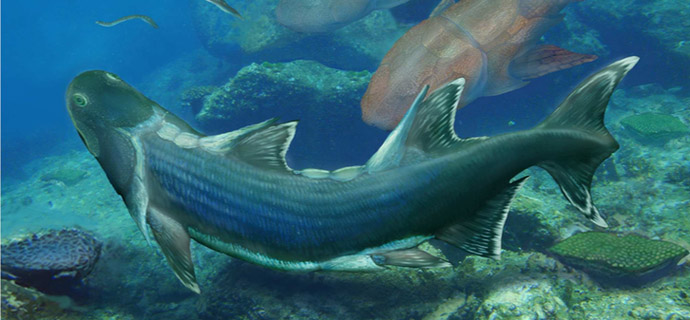
Silurian [si-loo r-ee-uh n, sahy-] ExamplesWord Origin adjective
- of or relating to the Silures or their country.
- Geology. noting or pertaining to a period of the Paleozoic Era, occurring from 425 to 405 million years ago, notable for the advent of air-breathing animals and terrestrial plants.
noun
- Geology. the Silurian Period or System of rocks.
Origin of Silurian First recorded in 1700–10; Silur(es) + -ian Related formspost-Si·lu·ri·an, adjectivepre-Si·lu·ri·an, adjective, noun Examples from the Web for silurian Historical Examples of silurian
The banks of the brook at this spot are composed of purple-brown slate (Silurian).
John Forrest
There are remains in the Silurian which show that there must have been a few fishes at that time.
Samuel Christian Schmucker
So the old Silurian seas were opened up to breed the fish in.
Mark Twain, A Biography, 1835-1910, Complete
Albert Bigelow Paine
He was already old in society, and belonged to the Silurian horizon.
Henry Adams
The Wenlock limestone (Silurian) contains an abundance of corals.
More Letters of Charles Darwin Volume II
Charles Darwin
British Dictionary definitions for silurian Silurian adjective
- of, denoting, or formed in the third period of the Palaeozoic era, between the Ordovician and Devonian periods, which lasted for 25 million years, during which fishes first appeared
- of or relating to the Silures
noun
- the Silurian the Silurian period or rock system
Word Origin and History for silurian Silurian adj.
1708, “pertaining to the Silures,” from Latin Silures “ancient British tribe inhabiting southeast Wales.” Geological sense is from 1835, coined by Sir Roderick Impey Murchison (1792-1871) because rocks of this period are especially frequent in Wales.
silurian in Science Silurian [sĭ-lur′ē-ən]
- The third period of the Paleozoic Era, from about 438 to 408 million years ago. During this time glaciers that formed during the late Ordovician melted, causing sea levels to rise. The first coral reefs, fish with jaws, and freshwater fish appeared, and jawless fish continued to spread rapidly. The first vascular plants also appeared, as did land invertebrates including relatives of spiders and centipedes. See Chart at geologic time.
 Liberal Dictionary English Dictionary
Liberal Dictionary English Dictionary